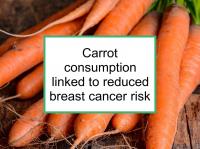Most of the evidence concerning the chemopreventive effects of carrots derives from studies regarding the beneficial micronutrients found in this vegetable. These include not only the familiar carotenoids beta-carotene and alpha-carotene, but also less well-known compounds such as falcarinol.
Purple carrots additionally contain delphinidin, which has been shown to inhibit HER2+ and triple negative (ER-/PR-/HER2-) breast cancer development and growth. However, it is possible that carrots contain other bioactive micronutrients that serve to prevent cancer or that several of the micronutrients act in synergy with each other, so that their combined effect is greater than that of the individual compounds. Now a new meta-analysis of 10 previous studies has reported that high carrot consumption is associated with reduced breast cancer risk.
One study has demonstrated that consuming eight ounces of fresh carrot juice per day can raise carotenoids levels to those associated with protection against breast cancer. Supplementation with beta-carotene or with vitamin A will not provide the same beneficial effects as consuming foods such as carrots. In fact, these supplements have been associated with increased risks of certain cancers, such as lung cancer. Note that non-organic carrots must be washed very thoroughly to remove pesticide residue.
Food sources of beta-carotene and/or alpha-carotene
Below are foods high in beta-carotene and/or alpha-carotene that have also been found to be associated with reduced breast cancer risk:
Olive oil and black pepper have both been found to increase the bioavailabilty of beta-carotene from other foods.
Latest research links high carrot consumption to reduced BC risk
The meta-analysis referenced above was designed to investigate the association between dietary carrot intake and breast cancer risk. To conduct the study, the authors identified relevant epidemiologic studies through September 2017. Data from 10 studies, which included 13,747 cases, were included in the analysis.
The risk of breast cancer using the combined data was found to be approximately 21% lower for women with the highest carrot compared to the lowest carrot intake levels, although there was significant variation in the individual study results. Also, the inverse associations between carrot consumption and breast cancer risk were more pronounced in case-control studies than in population studies. However, the inverse associations did not significantly differ according to geographical region, study quality, or exposure assessment. Omitting any of the studies individually had little effect on the combined results. The authors conclude that the results suggest that dietary carrot intake is associated with reduced breast cancer risk.
Please see our carrots webpage or the carotenoid tag for more information.
